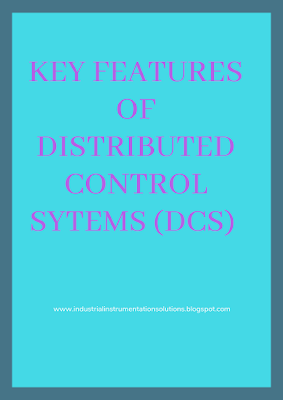DCS systems are
commonly used in Industrial Automation applications. We are going to look at
the features of these components that enable them to be integrated into an
automation system.
DCS
A DCS has an integrated development environment where I/O, control strategy, and operator graphics are created together and stored in a single database. This means the once a tag is created in the DCS it automatically becomes available everywhere in the system with the same human-readable tag name for use in basic control, advanced control, graphics, faceplates, trending, alarming, and turning etc. without mapping data through registers or other tag names. This makes additions and changes easy.
DCS
DCS is
focused on process control with analog signals and is used as main control
system in process industries like refining, petrochemicals, chemicals etc.
DCS supports
redundancy for controllers, power supply and control network, as well as
redundant I/O cards including fieldbus interface cards in the same backplane.
The control network supports peer-to-peer communication between the
controllers. In a DCS the field cabling lands on a Field Terminal Assembly
(FTA) where a special system cable with connector takes the signal to the I/O
card.
The loops in
a DCS are executed individually. The scan time in a DCS is set individual for
each loop. Most loops run at 1000 ms although 250 ms is common for pressure and
flow loops in refining and petrochemicals, and as fast as 100 ms is possible.
Most importantly, the scan time is isochronous as required for PID control and
time-based functions such as integration/totalizing and lead-lag dynamic
compensation etc., meaning it is constant, not changing with the task loading.
Loops in a DCS are managed individually, also change and download to one loop
doesn’t affect other loops.
A DCS has an integrated development environment where I/O, control strategy, and operator graphics are created together and stored in a single database. This means the once a tag is created in the DCS it automatically becomes available everywhere in the system with the same human-readable tag name for use in basic control, advanced control, graphics, faceplates, trending, alarming, and turning etc. without mapping data through registers or other tag names. This makes additions and changes easy.
The sensor
& actuator level ‘’H1’’ fieldbus network supported by DCS is primarily
FOUNDATION fieldbus for instrumentation and PROFIBUS-DP for motor controls.
The DCS
comes with its own fieldbus interface cards. The engineering software therefore
automatically configures the communication interface cards for the variables
used in the control strategy and graphics.
You can also read:
You can also read:

No comments:
Post a Comment